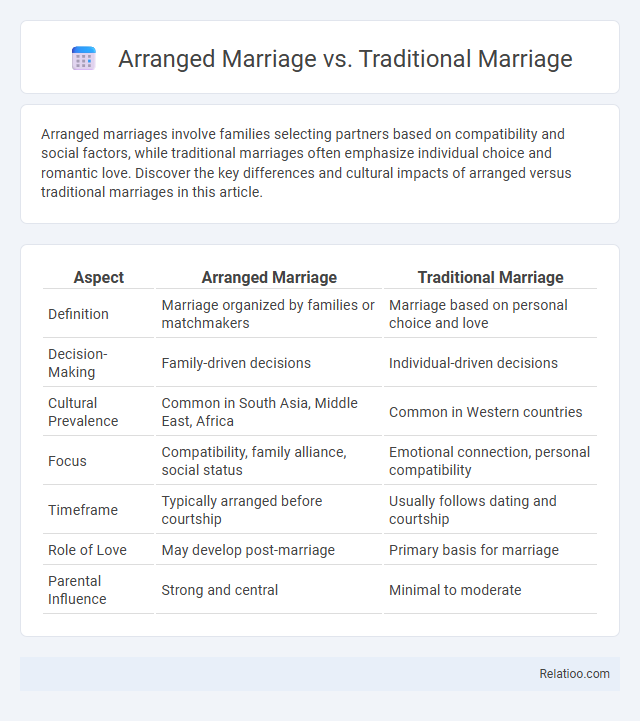Arranged marriages involve families selecting partners based on compatibility and social factors, while traditional marriages often emphasize individual choice and romantic love. Discover the key differences and cultural impacts of arranged versus traditional marriages in this article.
Table of Comparison
| Aspect | Arranged Marriage | Traditional Marriage |
|---|---|---|
| Definition | Marriage organized by families or matchmakers | Marriage based on personal choice and love |
| Decision-Making | Family-driven decisions | Individual-driven decisions |
| Cultural Prevalence | Common in South Asia, Middle East, Africa | Common in Western countries |
| Focus | Compatibility, family alliance, social status | Emotional connection, personal compatibility |
| Timeframe | Typically arranged before courtship | Usually follows dating and courtship |
| Role of Love | May develop post-marriage | Primary basis for marriage |
| Parental Influence | Strong and central | Minimal to moderate |
Understanding Arranged Marriages
Understanding arranged marriages involves recognizing they are carefully planned unions, often orchestrated by families based on social, cultural, and economic compatibility. Unlike traditional marriages, which may emphasize personal choice and romantic love, arranged marriages prioritize family values, long-term stability, and shared heritage. Your perspective on these differences can help navigate cultural expectations and personal preferences in marital decisions.
Defining Traditional Marriage
Traditional marriage is typically defined as a socially or culturally sanctioned union primarily based on love, mutual consent, and personal choice, often involving established customs and rituals specific to a community. Unlike arranged marriage, where family members or third parties play a significant role in selecting partners, traditional marriage emphasizes individual autonomy in partner selection. The distinction highlights varying degrees of involvement from families and societal influences in the formation of marital bonds across cultures.
Historical Background of Both Practices
Arranged marriage has deep roots in many cultures, often influenced by social, economic, and political factors that prioritized family alliances and community cohesion. Traditional marriage, depending on the region, evolved with customs centered on romantic choice or religious rites, reflecting societal values over time. Understanding the historical background of these practices helps you appreciate the diverse cultural significance and evolving dynamics of marital unions worldwide.
Cultural Influences Shaping Marriages
Cultural influences significantly shape arranged marriages by emphasizing family involvement, social status, and community values in selecting partners, often prioritizing compatibility and long-term stability over romantic love. Traditional marriages tend to reflect historical customs and rituals unique to specific cultures, embedding religious and societal norms that dictate roles, responsibilities, and ceremonies within the union. The interplay between arranged and traditional marriages highlights how cultural heritage and evolving social expectations continuously redefine marital practices worldwide.
Family Roles in Arranged and Traditional Marriages
Family roles in arranged marriages typically involve active participation of elders who select partners based on social compatibility and family values, reinforcing collective decision-making. In traditional marriages, family roles often emphasize inheritance of customs and maintaining lineage, with more autonomy given to the couple in partner choice. Both marriage types underscore the importance of parental approval and familial support as foundational elements for a stable union.
Autonomy and Personal Choice
Arranged marriages often involve family influence and community approval, which can limit individual autonomy and personal choice compared to traditional marriages based on romantic love and mutual selection. Traditional marriages typically prioritize personal preferences, allowing individuals greater freedom to choose partners aligned with their values and desires. Cultural norms surrounding arranged marriages may restrict autonomy, but variations exist where individuals negotiate their participation, blending family expectations with personal agency.
Success Rates and Relationship Satisfaction
Arranged marriages often show success rates comparable to or higher than traditional marriages due to strong family support and cultural alignment, contributing significantly to long-term relationship satisfaction. Traditional marriages, based on individual choice and romantic love, may experience varying success depending on compatibility and communication skills, but they tend to prioritize personal fulfillment and emotional connection. Your understanding of these differences can help in assessing relationship dynamics and setting realistic expectations for satisfaction and longevity.
Social Stigma and Perceptions
Arranged marriages often face social stigma due to misconceptions about lack of personal choice, while traditional marriages are generally perceived as a reflection of cultural continuity and familial approval. Social perceptions of arranged marriages can vary significantly by region, with some communities valuing them as a means of preserving social stability and others viewing them as restrictive. Comparing arranged and traditional marriages reveals complex attitudes where personal autonomy intersects with societal expectations and cultural norms, shaping diverse stigmas and acceptance levels.
Navigating Challenges in Both Marriage Types
Navigating challenges in arranged marriage versus traditional marriage requires understanding cultural expectations, communication barriers, and personal compatibility. You may face difficulties in balancing family involvement and individual desires, which demands open dialogue and mutual respect to strengthen the relationship. Both marriage types benefit from proactive conflict resolution and adaptability to sustain long-term partnership success.
Future Trends in Marriage Practices
Future trends in marriage practices indicate a growing blend of arranged and traditional marriage elements, driven by increasing intercultural exchanges and modernization. Technological advancements and social media influence are reshaping matchmaking processes, creating hybrid models that prioritize personal choice alongside familial involvement. Data shows younger generations prefer marriages that balance cultural heritage with individual autonomy, signaling a shift towards more flexible, negotiated marital arrangements.

Infographic: Arranged marriage vs Traditional marriage
 relatioo.com
relatioo.com